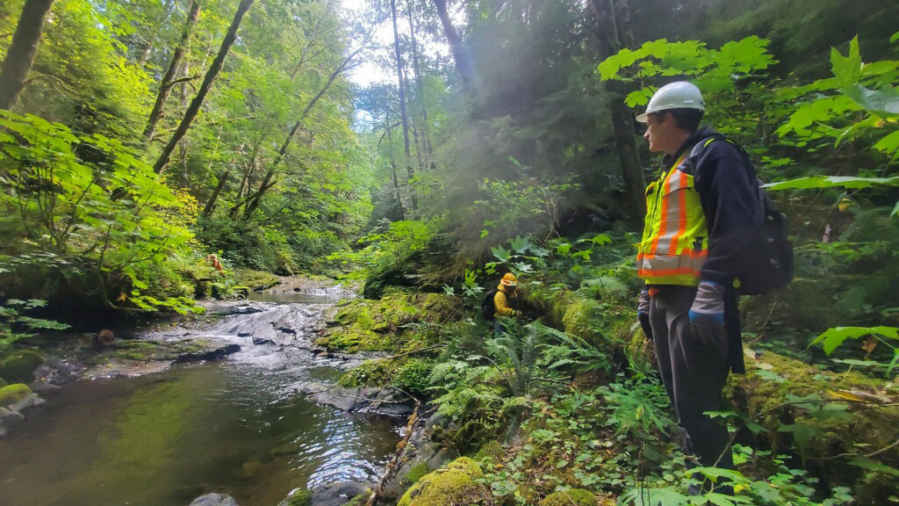As Congress continues to negotiate the coming year’s budget, a local conservation organization is lobbying for changes that would balloon its reach across Southwest Washington’s watersheds.
In March, the Regional Fisheries Coalition, a collection of Washington’s 14 regional fisheries enhancement groups, requested $3.8 million in federal funds from the Partners for Fish and Wildlife Program, a resource to help governments, nonprofits and tribes pursue restoration projects in their local environment.
Currently, these nonprofits receive less than $1 million annually through the federal program — roughly $71,000 split between each group, said Shauna Hanish-Kirkbride, managing director of the Lower Columbia Fish Enhancement Group, a Vancouver-based nonprofit.
“We are a pretty lean organization,” she said. “We’ve always prided ourselves in how we keep our costs down, but this just isn’t sustainable long-term.”
In the months that followed the Regional Fisheries Coalition’s request, congressional deliberations have resulted in both good and bad news for the conservation groups, according to Hanish-Kirkbride, who also serves as a treasurer for the coalition. The toss-up is linked to disagreements between the U.S. House and Senate versions of the aid package.
The Senate’s 2024 Department of the Interior and Environment appropriations proposal outlines that $65.2 million be directed to the Fish and Wildlife program. Enter Hanish-Kirkbride’s optimism: the bill specifies that “no less than $3.8 million for Washington Regional Fisheries Enhancement Groups,” fulfilling the coalition’s bid.
Conversely, the House proposed allocating $54.2 million to the U.S. Fish and Wildlife Program, a significant cut that doesn’t include language ensuring investments are directed to Washington. A lack of specific spending targets is one reason why the Lower Columbia Fish Enhancement Group received a slim investment of federal dollars in previous years, she said.
Congress will continue negotiations for the 2024 Consolidated Appropriations Act through Nov. 17, leading the Regional Fisheries Coalition to solicit support — backing the Senate’s budget — in a letter-writing campaign that ends Oct. 27.
According to a spokesperson for U.S. Rep. Marie Gluesenkamp Perez, D-Skamania, the congresswoman will support salmon recovery in Southwest Washington in any appropriations bills that land on the House floor. However, Perez is a Democrat in the Republican-controlled House, making investments to regional fisheries enhancement groups uncertain.
“We don’t know what’s going to happen,” Hanish-Kirkbride said.
Fish revival
So, what’s the story behind these groups?
In 1990, the Washington Legislature created the Regional Fisheries Enhancement Group Program when many salmon runs were deemed threatened or endangered. By 1999, wild fish populations had dwindled from their traditional breeding grounds in Washington, Oregon, Idaho and California, according to the Washington Recreation and Conservation Office.
Each nonprofit fish enhancement group operates within their own watershed boundaries to spearhead salmon recovery.
The Lower Columbia Fish Enhancement Group encompasses watersheds across Clark, Cowlitz, Skamania and Wahkiakum counties. Their restoration efforts — from removing invasive plants to installing floodplain structures — dot the Coweeman, Grays, Little Washougal and South Fork Toutle rivers.
And it’s all done with a team of six staff members who, Hanisch-Kirkbride described, “punch above their own weight” with what’s afforded to them.
Federal dollars are a substantial chunk of the group’s base funding and support the development of salmon recovery projects and programs, as well as sustain staff and volunteer capacity. Commercial and recreational fishing license fees administered through Washington Fish and Wildlife partially fund this work, as do excess egg and carcass sales from hatcheries.
The Lower Columbia Fish Enhancement Group receives roughly $150,000 annually from all these sources, Hanisch-Kirkbride continued, an amount that won’t be sustainable long-term. Project maintenance costs can grow and, when mixed with gradual inflation, strain limited funding pots.




